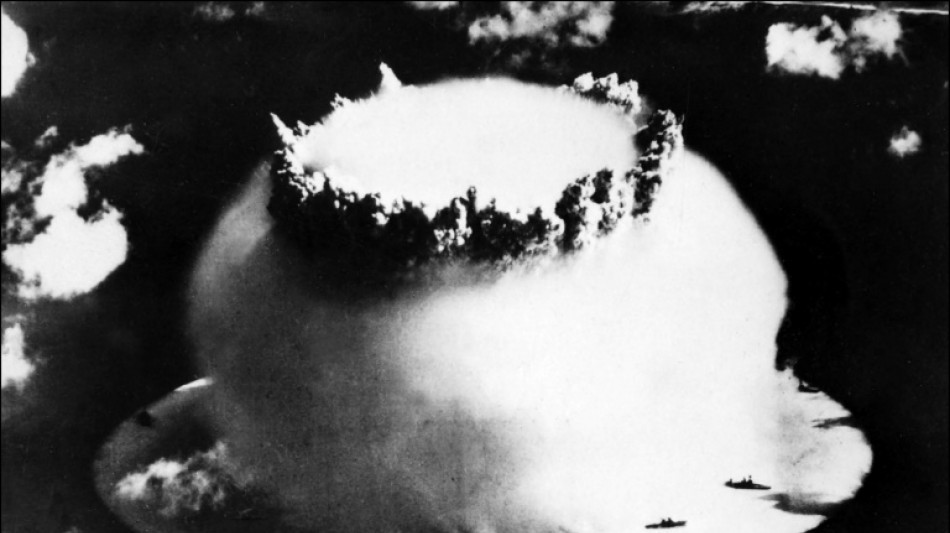
-
 Eurozone economy grows more than expected despite US tariff turmoil
Eurozone economy grows more than expected despite US tariff turmoil
-
Toulouse hooker Mauvaka out of Champions Cup semi

-
 Germany's next finance minister, 'bridge-builder' Lars Klingbeil
Germany's next finance minister, 'bridge-builder' Lars Klingbeil
-
Mehidy century puts Bangladesh in command against Zimbabwe

-
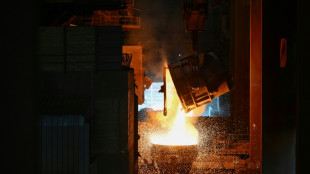 Steelmaker ArcelorMittal warns of uncertainty
Steelmaker ArcelorMittal warns of uncertainty
-
Vietnam's Gen-Z captivated by 50-year-old military victory

-
 Moroccan-based cardinal says Church does not need Francis 'impersonator'
Moroccan-based cardinal says Church does not need Francis 'impersonator'
-
US official tells UN top court 'serious concerns' over UNRWA impartiality

-
 Jeep owner Stellantis suspends outlook over tariffs
Jeep owner Stellantis suspends outlook over tariffs
-
New Zealand, Phillippines sign troops deal in 'deteriorating' strategic environment

-
 Aston Martin limits US car imports due to tariffs
Aston Martin limits US car imports due to tariffs
-
Pakistan says India planning strike as tensions soar over Kashmir
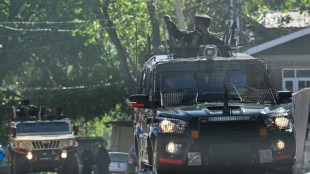
-
 Australian triple-murder suspect allegedly cooked 'special' mushroom meal
Australian triple-murder suspect allegedly cooked 'special' mushroom meal
-
Most stock markets rise despite China data, eyes on US reports
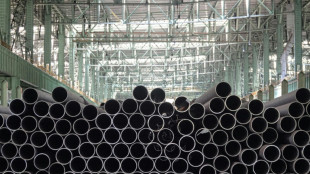
-
 TotalEnergies profits drop as prices slide
TotalEnergies profits drop as prices slide
-
Volkswagen says tariffs will dampen business as profit plunges

-
 Jeep owner Stellantis suspends 2025 earnings forecast over tariffs
Jeep owner Stellantis suspends 2025 earnings forecast over tariffs
-
China's Shenzhou-19 astronauts return to Earth
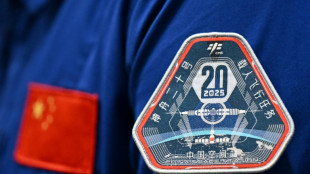
-
 French economy returns to thin growth in first quarter
French economy returns to thin growth in first quarter
-
Ex-Premier League star Li Tie loses appeal in 20-year bribery sentence
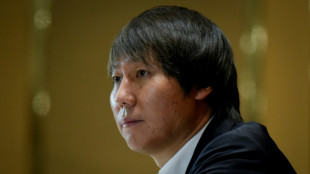
-
 Belgium's green light for red light workers
Belgium's green light for red light workers
-
Haliburton leads comeback as Pacers advance, Celtics clinch

-
 Rahm out to break 2025 win drought ahead of US PGA Championship
Rahm out to break 2025 win drought ahead of US PGA Championship
-
Japan tariff envoy departs for round two of US talks
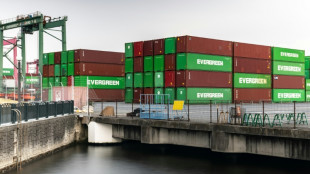
-
 Djurgarden eyeing Chelsea upset in historic Conference League semi-final
Djurgarden eyeing Chelsea upset in historic Conference League semi-final
-
Haliburton leads comeback as Pacers advance, Pistons stay alive

-
 Bunker-cafe on Korean border paints image of peace
Bunker-cafe on Korean border paints image of peace
-
Tunics & turbans: Afghan students don Taliban-imposed uniforms

-
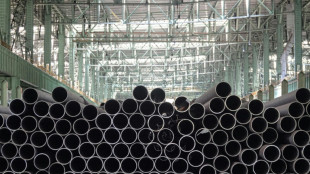 Asian markets struggle as trade war hits China factory activity
Asian markets struggle as trade war hits China factory activity
-
Norwegian success story: Bodo/Glimt's historic run to a European semi-final

-
 Spurs attempt to grasp Europa League lifeline to save dismal season
Spurs attempt to grasp Europa League lifeline to save dismal season
-
Thawing permafrost dots Siberia with rash of mounds
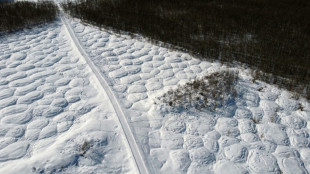
-
 S. Korea prosecutors raid ex-president's house over shaman probe: Yonhap
S. Korea prosecutors raid ex-president's house over shaman probe: Yonhap
-
Filipino cardinal, the 'Asian Francis', is papal contender

-
 Samsung Electronics posts 22% jump in Q1 net profit
Samsung Electronics posts 22% jump in Q1 net profit
-
Pietro Parolin, career diplomat leading race to be pope

-
 Nuclear submarine deal lurks below surface of Australian election
Nuclear submarine deal lurks below surface of Australian election
-
China's manufacturing shrinks in April as trade war bites
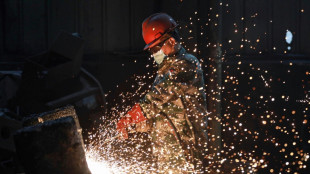
-
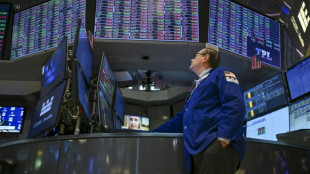 Financial markets may be the last guardrail on Trump
Financial markets may be the last guardrail on Trump
-
Swedish journalist's trial opens in Turkey

-
 Kiss says 'honour of a lifetime' to coach Wallabies at home World Cup
Kiss says 'honour of a lifetime' to coach Wallabies at home World Cup
-
US growth figure expected to make for tough reading for Trump
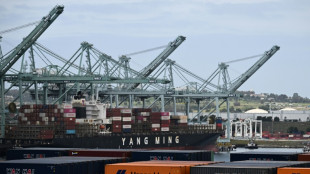
-
 Opposition leader confirmed winner of Trinidad elections
Opposition leader confirmed winner of Trinidad elections
-
Snedeker, Ogilvy to skipper Presidents Cup teams: PGA Tour

-
 Win or bust in Europa League for Amorim's Man Utd
Win or bust in Europa League for Amorim's Man Utd
-
Trump celebrates 100 days in office with campaign-style rally

-
 Jointly Funded Research Explores Cutting-Edge RNA Sequencing in Rare Ovarian Cancer
Jointly Funded Research Explores Cutting-Edge RNA Sequencing in Rare Ovarian Cancer
-
Amphastar Pharmaceuticals to Release First Quarter Earnings and Hold Conference Call on May 7th, 2025

-
 GoodData Reports Record Q1 Growth, Sets Stage for AI Launch in Q2 2025
GoodData Reports Record Q1 Growth, Sets Stage for AI Launch in Q2 2025
-
Liberty Backs Business Owners Following 2025-26 Australian Federal Budget


Signs of the human era, from nuclear fallout to microplastics
As scientists make the case that humans have fundamentally transformed the planet enough to warrant our own geological epoch, another question arises: is there anything left untouched by humanity's presence?
Soaring greenhouse gases, ubiquitous microplastics, pervasive "forever chemicals", the global upheaval of animals, even old mobile phones and chicken bones -- all have been put forward as evidence that the world entered the Anthropocene, or era of humans, in the mid-20th century.
Jan Zalasiewicz, a British geologist who chaired the Anthropocene Working Group for over a decade, paused for a moment when asked if there was anywhere on Earth that lacked signs of human influence.
"It's hard to think of a more remote place" than the Pine Island glacier in Antarctica, Zalasiewicz told AFP.
Yet when scientists drilled deep below the glacier's ice a few years ago, they found traces of plutonium.
It was lingering fallout from nuclear weapon tests that began in 1945, leaving behind a radioactive presence unlike anything before.
Zalasiewicz said these radionuclides represented perhaps "the sharpest signal" to mark the start of the Anthropocene epoch 70 years ago.
But "there's an awful lot to choose from," he added.
On Tuesday, the Anthropocene Working Group is expected to announce its choice for the epoch's "golden spike" location, selecting the site that most clearly represents the many ways humans have changed the world.
However the announcement will not make the Anthropocene an official geological time unit just yet, as the world's geologists continue to sift through the evidence.
- The weight of humanity -
Another major calling card of the Anthropocene will likely come as little surprise: the rapid surge in carbon dioxide and other greenhouse gases that are heating the world.
Many things changed "once humans developed the technology to pull fossilised sunshine -- in the form of oil, coal and gas -- out of the ground," Zalasiewicz said.
Humans have consumed more energy since 1950 than was used in the previous 11,700 years of the Holocene epoch, the Anthropocene scientists have shown.
This new power was used to dominate the world in a way not previously possible. Both land and animals were deployed to feed the exploding human population.
Humans and their livestock make up 96 percent of the biomass of all land mammals on the planet, with wild mammals representing just four percent, researchers estimated in 2018.
Supermarket chickens, bred by humans to grow far larger than natural, account for two thirds of the biomass of all birds, Zalasiewicz said.
Humans also reshuffled species across the globe, introducing invasive species such as rats to even the most remote Pacific islands.
- Technofossils, forever chemicals -
In 2020, researchers estimated that the mass of all objects made by humans has now exceeded the weight of all living things on the planet.
The Anthropocene researchers called these objects "technofossils".
Successive generations of mobile phones, which so quickly become obsolete, were just one example of a technofossil that will "be part of the Anthropocene record," Zalasiewicz said.
Smaller pieces of plastic called microplastics have been detected on the planet's highest peaks and at the bottom of the deepest oceans.
Substances called PFAS or "forever chemicals," created for products such as non-stick cookware, are also being increasingly identified across the world.
Pesticides, fertilisers, increasing levels of nitrogen of phosphorus, even the buried skeletons of humans -- the list of potential Anthropocene markers goes on.
The scientists say that hundreds of thousands of years into the future, all of these markers will be clearly preserved to give our future ancestors -- or any other beings who care to look -- insight into this human era.
But what will this future geologist see happen next?
"One of the signals that you would want to see from the Anthropocene is humanity responding in a positive way," said Mark Williams, a British palaeontologist and member of the Anthropocene Working Group.
The fossil record does not yet show a mass extinction, but one "is now very much on the cards," he told AFP.
"We go two ways from here," he added.
So is there somewhere left on Earth that does not bear a human fingerprint?
The scientists agreed that the only such place was likely somewhere under the ice in Antarctica.
But if nothing changes, these ice sheets will be steadily melted by global warming, Zalasiewicz warned.
P.Mathewson--AMWN

